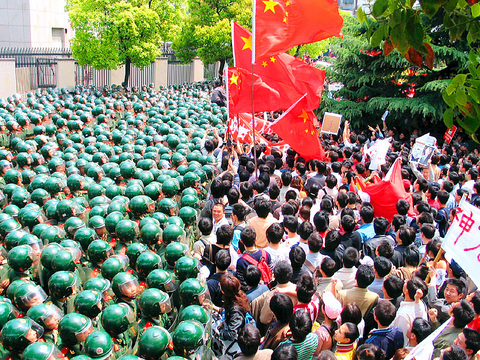Chanting "Japanese pigs get out!," protesters threw stones and broke windows at Japan's consulate and Japanese restaurants in Shanghai as tens of thousands of people defied government warnings and staged demonstrations yesterday against Tokyo's bid for a permanent UN Security Council seat.
Protests were reported in two other cities. But Beijing remained calm as police stood guard on Tiananmen Square to block a planned protest in the capital, a day ahead of a visit by Japan's foreign minister. Paramilitary police surrounded the Japanese Embassy, where protesters smashed windows last weekend.
The third weekend of protests erupted despite government demands for calm. Communist leaders apparently worry that the protests might do more damage to relations with Tokyo, which are at their lowest point in decades, or encourage others to take to the street to protest corruption or demand political reforms.

PHOTO: EPA
In Shanghai, as many as 20,000 protesters gathered around the Japanese Consulate. Police in riot helmets kept them away from the building but let protesters throw eggs and rocks. A group of young men broke the windows of a Nissan sedan and flipped it onto its roof.
In a nearby street, protesters broke windows at about 10 Japanese-style noodle shops and bars, many of them Chinese-owned. Others broke the windows of a police car, chanting "Kill the Japanese!," after a rumor spread that a man sitting inside was Japanese. The car drove away before the crowd could grab him.
The violence followed a march from City Hall to the consulate by about 5,000 people. They carried banners saying in English, "Say No to Japan in the Security Council" and chanted "Japanese pigs get out!"
A sign outside the consulate said, "Be Vicious Toward Japanese Devils."
"We have protested to the Foreign Ministry many times today, asking them to stop this violence," said Keiji Ide, spokesman for the Japanese Embassy in Beijing. "They promised to do their best."
A protest march in Hangzhou, southwest of Shanghai, attracted 10,000 people who shouted "slogans condemning Japanese militarism," the official Xinhua News Agency reported. In Tianjin, east of Beijing, about 2,000 protesters held a peaceful one-hour march.
Police also blocked a protest in the southern city of Guangzhou, shooing away people who tried to gather at a stadium.
Japan's foreign minister was preparing to fly to Beijing on Sunday for talks aimed at defusing the tensions. Japan warned its citizens in China about possible danger in advance of the protests. The US issued a similar warning.
Some suggested Beijing permitted the protests last weekend to support a campaign to block Tokyo's Security Council bid.
In Shanghai, police didn't try to stop the protest, though state newspapers said no one had received permission to hold one. At one point, police posted a sign saying, "March route this way."
Also see stories:

Conflict with Taiwan could leave China with “massive economic disruption, catastrophic military losses, significant social unrest, and devastating sanctions,” a US think tank said in a report released on Monday. The German Marshall Fund released a report titled If China Attacks Taiwan: The Consequences for China of “Minor Conflict” and “Major War” Scenarios. The report details the “massive” economic, military, social and international costs to China in the event of a minor conflict or major war with Taiwan, estimating that the Chinese People’s Liberation Army (PLA) could sustain losses of more than half of its active-duty ground forces, including 100,000 troops. Understanding Chinese

The Ministry of Foreign Affairs (MOFA) yesterday said it is closely monitoring developments in Venezuela, and would continue to cooperate with democratic allies and work together for regional and global security, stability, and prosperity. The remarks came after the US on Saturday launched a series of airstrikes in Venezuela and kidnapped Venezuelan President Nicolas Maduro, who was later flown to New York along with his wife. The pair face US charges related to drug trafficking and alleged cooperation with gangs designated as terrorist organizations. Maduro has denied the allegations. The ministry said that it is closely monitoring the political and economic situation

‘SLICING METHOD’: In the event of a blockade, the China Coast Guard would intercept Taiwanese ships while its navy would seek to deter foreign intervention China’s military drills around Taiwan this week signaled potential strategies to cut the nation off from energy supplies and foreign military assistance, a US think tank report said. The Chinese People’s Liberation Army (PLA) conducted what it called “Justice Mission 2025” exercises from Monday to Tuesday in five maritime zones and airspace around Taiwan, calling them a warning to “Taiwanese independence” forces. In a report released on Wednesday, the Institute for the Study of War said the exercises effectively simulated blocking shipping routes to major port cities, including Kaohsiung, Keelung and Hualien. Taiwan would be highly vulnerable under such a blockade, because it

UNRELENTING: China attempted cyberattacks on Taiwan’s critical infrastructure 2.63 million times per day last year, up from 1.23 million in 2023, the NSB said China’s cyberarmy has long engaged in cyberattacks against Taiwan’s critical infrastructure, employing diverse and evolving tactics, the National Security Bureau (NSB) said yesterday, adding that cyberattacks on critical energy infrastructure last year increased 10-fold compared with the previous year. The NSB yesterday released a report titled Analysis on China’s Cyber Threats to Taiwan’s Critical Infrastructure in 2025, outlining the number of cyberattacks, major tactics and hacker groups. Taiwan’s national intelligence community identified a large number of cybersecurity incidents last year, the bureau said in a statement. China’s cyberarmy last year launched an average of 2.63 million intrusion attempts per day targeting Taiwan’s critical